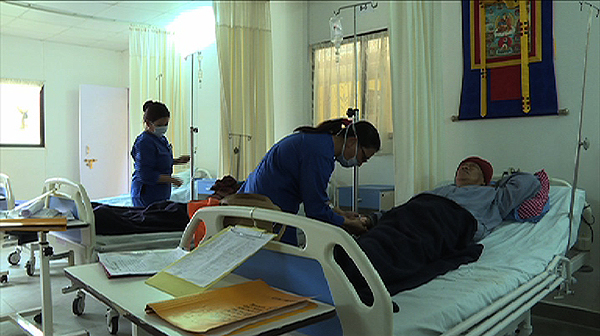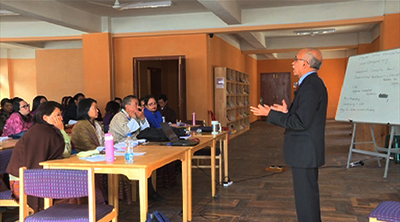 Phuntsho Om and Tara Devi, both Associate Lecturers with the Faculty of Nursing and Public Health at the Khesar Gyalpo University of Medical Sciences (KGUoMS) in Thimphu, are working on a module on palliative care.
Phuntsho Om and Tara Devi, both Associate Lecturers with the Faculty of Nursing and Public Health at the Khesar Gyalpo University of Medical Sciences (KGUoMS) in Thimphu, are working on a module on palliative care.
The module, which is being developed for the students of KGUoMS, is part of efforts to introduce palliative care in the country’s health care delivery. Palliative care is a specialised approach to improving the quality of lives of patients battling life-limiting illnesses like cancer.
The health care system in Bhutan is disease-centred, focused largely on examining and curing diseases only. But patients, particularly those with terminal illnesses, require more than physical pain relief.
They need emotional, social and psychological care and this is exactly what the palliative care provides. It brings in that extra layer of support often missing in the conventional health care delivery.
Phuntsho Om and Tara Devi are among the eight nurses who are the only health care workers in the country with some kind of training in palliative care. They attended a six-week long training on palliative in India last year.
Phuntsho Om shares the training has changed the way she looks at patients. “Now, when I deal with a patient, I am not just looking at their wounds or fractures for which we have to give nursing care,” she said.
“Instead, I am looking at the patient’s overall wellbeing, which involves taking care of their psychological, spiritual and social well being along with their physical well being.”
At the moment, Phuntsho Om and Tara Devi, who also works as part-time nurses apart from their role as Associate Lecturers, and six other nurses who attended the training on palliative care are doing what they can to make the lives of patients in the national referral hospital’s Oncology Ward comfortable.
But what they are doing is barely enough. It is not just the patients with oncologic diseases that need palliative care. Patients with other chronic and life-limiting diseases require it as well.
But because there aren’t enough trained health care workers, many needy patients remain without access to palliative care, a treatment approach that Dr. Rajagopal, the Chairman of Trivandrum Institute of Palliative Sciences of India, describes as an essential part of national health care.
Dr. Rajagopal says palliative care is indispensable for the overall well being of a patient. Palliative care, he describes, is about doctors, nurses and brothers treating people as whole, not just the disease. “At the moment, there is a cruel rejection of people, especially if they have incurable illness, and there is too much emphasis on disease and attacking diseases and trying to cure them,’ said Dr. Rajagopal.
“But whether the disease is curable or not, whether it is physical, psychological, social or spiritual, suffering needs to be treated. The diseases like cancer and the anxiety, fear and stress that come from it need to be treated. Their well-being is important to the last day of their life.”
The module for the palliative care is expected to go a long way in making palliative care a part of the country’s health care delivery. The Khesar Gyalpo University of Medical Sciences is also organising a workshop to educate health workers on palliative care. The three-day workshop began yesterday.








